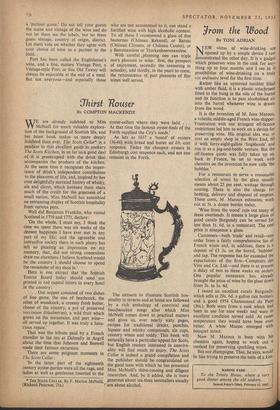Thirst Rouser
By COMPTON MACKENZIE
WE are already indebted to Miss McNeill for much valuable explora- tion of the background of Scottish life, and her latest book makes us more deeply indebted than ever. The Scots Cellar* is a pendant to that excellent guide to cookery The Scots Kitchen, in so far as a good deal of it is preoccupied with the drink that accompanies the products of the kitchen. At the same time it recognises the impor- tance of drink's independent contribution to the pleasures of life, and, inspired by her own delightfully narrated history of whisky, ale and claret, which between them share much of the credit for the greatness of a small nation, Miss McNeill has assembled an entrancing display of Scottish hospitality from various pens.
Well did Benjamin Franklin, who visited Scotland in 1759 and 1771, declare : 'On the whole, I must say, I think the time we spent there was six weeks of the densest happiness I have ever met in any part of my life; and the agreeable and instructive society there in such plenty has left so pleasing an impression on my memory, that, did not strong connexions draw me elsewhere I believe Scotland would be the country I should choose to spend the remainder of my days in.'
Here is one extract that the Scottish Tourist Board today should send out printed in red capital letters to every hotel in the country :
. . Our supper consisted of two dishes of fine game, the one of heathcock, the other of woodcock, a creamy fresh butter, cheese of the country, a pot of preserved vaccinium (blaeberries), a wild fruit which grows on the mountains, and port wine— all served up together. It was truly a luxu- rious repast.'
That was the tribute paid by a French traveller to the inn at Dalmally in Argyll about the time that Johnson and Boswell made their famous excursion.
There are some poignant moments in The Scots Cellar: 'In the latter part of the eighteenth century oyster-parties were all the rage, and ladies as well as gentlemen resorted to the
• THE SCOTS CELLAR. By F. Marian McNeill. (Richard Paterson, 21s.)
oyster-cellars where they were held. . . . At that time the famous oyster-beds of the Forth supplied the City's needs.'
As late as 1837 a 'board' of oysters (36-66) with bread and butter ad lib. cost tenpence. Today the cheapest oysters in Edinburgh cost tenpence each, and not one remains in the Forth.
The extracts to illustrate Scottish hos- pitality in taverns and at home are followed by a rich anthology of convivial and bacchanalian songs after which Miss McNeill comes down to practical matters and gives us, over nearly sixty pages, recipes for traditional drinks, punches, liqueur and whisky compounds, ale cups, country wines and toddy. This book will naturally have a particular appeal for Scots, but English readers interested in convivi- ality will find much to enjoy. The Scots Cellar is indeed a grand compilation and the publisher should be congratulated on the good taste with which he has presented Miss McNeill's thirst-rousing and diligent researches. And, be it added, she is more generous about tea than teetotallers usually are about alcohol.










































































 Previous page
Previous page